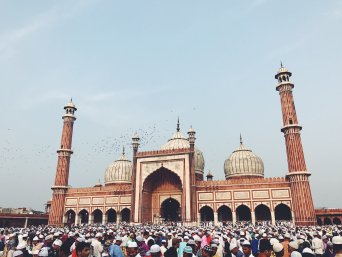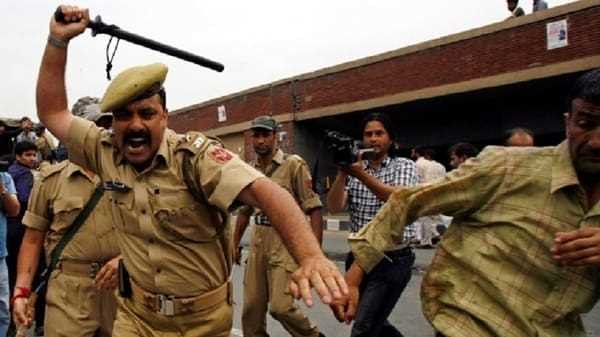- About
- Topics
- Picks
- Audio
- Story
- In-Depth
- Opinion
- News
- Donate
- Signup for our newsletterOur Editors' Best Picks.Send
Read, Debate: Engage.
| topic: | Freedom of Expression |
|---|---|
| located: | India |
| editor: | Hanan Zaffar |
This week, thousands of Christians in the Indian state of Chhattisgarh fled their villages as a result of continuous attacks by Hindu extremists. The victims have accused people belonging to the Hindu-right wing - specifically those affiliated with Rashtriya Swayamsevak Sangh (RSS), the ideological parent of the ruling BJP - of targeting their community. The incident, however, is not an isolated event in the context of the current Indian political environment.
In the last few years, the country has witnessed increased religious intolerance, especially towards minorities. Incidents of violence and hate crimes have risen and the state on its part is accused of blatantly perpetrating and facilitating such incidents in pursuit of fanning majoritarian and anti-minority sentiments. Critics of the government accuse the ruling Hindu-nationalist BJP of aiming to convert the country into a Hindu state as many of its leaders have been actively engaging in the anti-minority rhetoric, particularly against Muslims and Christians.
The United States Commission on International Religious Freedom (USCIRF).\, in its recent annual report, recommended the US state department to designate India as a “country of particular concern,” and expressed concerns over the worsening conditions of religious freedom in the country.
“During the year, the Indian government escalated its promotion and enforcement of policies—including those promoting a Hindu-nationalist agenda—that negatively affect Muslims, Christians, Sikhs, Dalits, and other religious minorities,” the report stated. It also mentioned different instances of the Indian government’s systemisation of its ideological vision of a Hindu state while employing existing and new laws and structural changes that target the country’s religious minorities.
This year particularly saw numerous blatant attacks on minorities by the governments at the state and central levels. In the aftermath of communal clashes between Muslims and Hindus in different regions, which were allegedly started by right-wing Hindus, authorities razed houses of Muslims in these areas. In the same vein, in the southern state of Karnataka, Muslim girls wearing hijabs were prohibited from entering educational institutes. Ruled by the BJP, the state government fully backed the move which was an attack on the freedom of religion and the choice of hundreds of Muslim girls.
Anti-terror laws have also been used to target journalists and activists critical of the government, particularly those belonging to minority communities. Prominent fact-checker Muhammad Zubair, who is a leading voice against the ruling party, remained in jail for several months for his public criticisms. Similarly, prominent human rights activists and journalists ,like Siddiqui Kappan, Stan Swamy, Khuram Parvez and others remain in prison.
In another incident showcasing the state’s attitude towards minorities, authorities released 11 convicts serving life sentences for the gangrape of Bilkis Bano, a Muslim woman, and the murder of 14 members of her family, including her infant daughter, during the infamous 2002 Gujarat riots.
There are numerous other incidents wherein the current ruling party has been accused of actively targeting minorities in pursuit of its divisive politics. From villainising minorities in order to appease the majority, and changing historic narratives to suit their politics, the ruling party is accused of harming the secular credentials of the country’s constitution.
In such a context, the institution of the judiciary, which is supposed to be the guardian of constitutional rights, is expected to step in and provide the citizens with some sort of relief and hold the government accountable for the secular principles as envisioned by the constitution. However, the judiciary is yet to provide any strict pushback to communal practices. While its potential cannot be dismissed entirely, and one still hopes for some action from its benches, a strong accountability check of government has yet not been witnessed.
Photo by Naveed Ahmed

